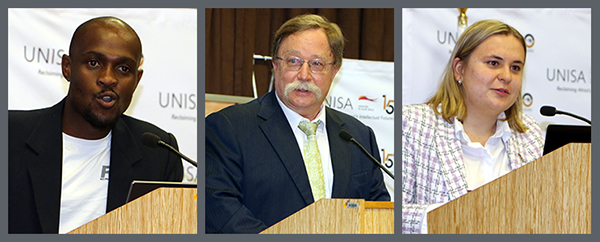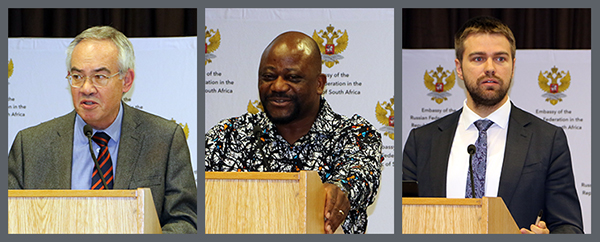
On 19 April 2024, Unisa’s National Student Representative Council (NSRC), together with the Internationalisation and Partnerships Directorate, hosted a diplomatic engagement with the Ambassador of the Russian Federation to South Africa and the Kingdom of Lesotho, His Excellency Ilya Rogachev, themed The changing world geopolitics and the role played by Russia.

NSRC President Nkosinathi Mabilane, His Excellency Ilya Rogachev and Polina Kulakova
In his opening address, NSRC President, Nkosinathi Mabilane, stated that Russia is highly respected as a key figure in geopolitics – a big brother needed against the West. He continued: "In a world marked by geopolitical tensions and power struggles, it is imperative that we reevaluate our perspectives and recognise the pivotal role that Russia plays in fostering global stability and balance."
Mabilane said that the world is on the brink of World War Three, because of the West bullying smaller nations. He mentioned that Palestine is still not free, and that Israel continued to perpetuate apartheid against the Palestinians.
"We must acknowledge Russia’s rich history," he continued. "Throughout the annals of time, Russia has stood against Western expansion, from the Napoleonic wars to the cold-war era, while consistently defending its sovereignty and independence with valiant resilience. We, as South Africans, must look at Russia as a country to benchmark against."
Mabilane was critical of powerful countries, especially Western ones, for having too much control over world affairs. He explained that this gives them unfair influence over smaller countries. As an example, Mabilane pointed to the African Growth and Opportunity Act (AGOA), a United States (US) programme that benefits some African nations by allowing them easier access to the US market. "But recently," he said, "the US removed several African countries from the programme." Mabilane sees this as an example of a bigger country bullying smaller ones.
Mabilane stated that Russia is strategically positioned to serve as a counterbalance in ensuring that no single power nation dominates the internationals stage. "Moreover," he continued, "Russia possesses largely untapped economic potentials. And through forging international ties outside the West’s sphere, through efforts such as BRICS (Brazil, Russia, India, China and South Africa), Russia can catalyse the growth and prosperity on a global scale, through its abundance of natural resources."
He added that strategic alliances between Russia and other nations are paramount in addressing pressing global challenges, such as combating terrorism, and mitigating climate change effects and other key facets discussed during the BRICS Summits
"By transcending geopolitical divides, we can collectively tackle the most daunting issues of our time," he concluded.
In his keynote address, His Excellency Rogachev stated that Russia has always been an obstacle against the dominance of the West. He revealed that 80% of the world media has been captured by the West, making their gate-keeping methods effective. This, he said, can be witnessed in how the news about Ukraine and Russia’s war is reported by Western media.
Rogachev further stated that many universal institutions and human rights bodies, which were supposed to remain neutral, are controlled by the West. He mentioned the International Monetary Fund (IMF), the World Bank and the United Nations, among others. "They have a Western agenda, and their activities are politicised and aligned to Western policies," he said.
Rogachev also stated that international sports are also politicised. He explained: "During the Pyeongchang 2018 Winter Olympics, the Russian hockey team were barred by the International Olympic Committee (IOC) from having their flag raised or anthem played."
Rogachev applauded South Africa for hosting a successful BRICS summit in 2023. "This summit," he said, "is significant because it highlights a shift in global power." He explained that the world is moving away from a unipolar system, dominated by Western powers, towards a multipolar one. "This," he said, "means new economic and political centres of power are emerging, challenging the traditional order."
Rogachev emphasised the importance of multipolarity for dismantling neocolonialism. He argued that that for centuries, Western countries have dominated the world through military force, colonisation, slavery and other means. "A multipolar world, with strong players like BRICS members, can challenge this legacy," he added.
In his concluding remarks, Rogachev elaborated on Russia’s position as the incoming chair of the BRICS grouping for this year. He emphasised the significance of this role, highlighting the opportunity to steer the organisation's agenda and guide its focus on critical issues facing emerging economies. This leadership role, he said, would be undertaken with a spirit of collaboration and a commitment to furthering BRICS's collective goals in the pursuit of a more equitable and multipolar world order.
In a presentation aimed at facilitating student exchange opportunities, Polina Kulakova, Attaché from the Russian Embassy, provided a comprehensive overview of Russian universities that offer exchange programmes for students from Unisa. The presentation included details about the universities themselves, such as their location, areas of specialisation and programme offerings. Kulakova also covered aspects relevant to the exchange programmes, such as eligibility requirements, application procedures, available courses, and potential scholarships or financial aid options.

Prof Dirk Kotze, Prof Everisto Benyera and Vladimir Poluektov
A panel discussion on BRICS and Russia’s stance in the ever-evolving geopolitics featured inputs from Unisa's College of Human Sciences (CHS) Professors Dirk Kotze and Everisto Benyera, and Russia’s First Secretary of the Department of Foreign Policy Planning of the Russian Foreign Ministry, Vladimir Poluektov.
This diplomatic engagement fostered a discussion on the complexities of contemporary geopolitics and Russia's role within it. The participation of Rogachev and the university’s students offered valuable insights into Russia's perspective on the evolving global order. Furthermore, the collaboration between the NSRC and the Internationalisation and Partnerships Directorate highlighted the university's commitment to fostering international dialogue and promoting global citizenship among its student body.
* By Godfrey Madibane, Acting Journalist, Department of Institutional Advancement
Publish date: 2024-04-25 00:00:00.0